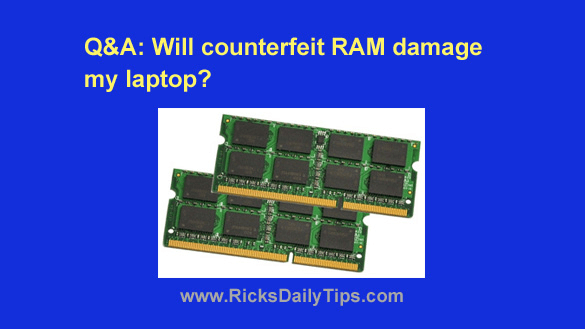Note: The links in this post are affiliate links.
Question from Hailey: Rick, I think I’ve gotten myself into a mess and I need your advice.
I recently purchased two RAM modules on Ebay to go an older laptop I own.
The modules I bought were listed and sold as Kingston brand but I just found out that the seller was busted for selling counterfeit computer parts.
The new RAM seems to be working fine in my laptop, but I was wondering if it might cause problems down the road.
I’d just remove it and reinstall the old memory but I gave it to my nephew in exchange for doing the upgrade for me. It’s already in his computer and I won’t ask for it back.
What do you think I should do?
Rick’s answer: Hailey, if you asked 10 computer techs this question you’d probably get 10 different answers, and here’s mine:
I’d bite the bullet and buy new RAM that you know to be the real thing.
Counterfeit computer parts are everywhere, and their quality ranges anywhere from horrible to acceptable. The problem is there’s no way of knowing the quality of the RAM you bought except to know that it appears to work.
If there’s a defective component on one or both of those counterfeit RAM sticks, it could easily cause some serious issues down the road.
The good news is that since you bought the RAM on Ebay there’s a good chance you paid for it via PayPal. And since you were the victim of fraud, your transaction should be covered under PayPal’s Buyer Protection Plan.
If I were you I’d file a complaint with PayPal and request a refund. I feel fairly certain that you’ll get it.
You can then apply the refunded money towards the purchase of legitimate RAM.
By the way, your situation is one of the many reasons why I buy all of my RAM upgrades from either Amazon or Crucial.
Bottom line: Ebay is a great place to find great deals on all kinds of merchandise, but counterfeit computer parts are no bargain at any price.